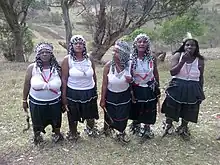sangoma
English
WOTD – 23 September 2020
Etymology

Borrowed from Zulu isángoma (“diviner, witch doctor, sangoma”),[1][2] possibly from i- + sa- (prefix meaning ‘of’) + íngoma (“dance song performed at a festival; hymn”). The English word is cognate with Afrikaans sangoma, Swazi sángoma.[1]
Pronunciation
- (Received Pronunciation) IPA(key): /sæŋˈɡəʊmə/, /-ˈɡɔː-/
- (General American) IPA(key): /sæŋˈɡoʊmə/, /-ˈɡɔ-/
Audio (GA) (file) - Rhymes: -əʊmə, -ɔːmə
- Hyphenation: san‧go‧ma
Noun
sangoma (plural sangomas)
- (South Africa and other parts of Southern Africa) A (usually female) traditional healer or herbalist, or witch doctor.
- Synonym: isangoma
- 1895, J. Forsyth Ingram, “Section III. People, Language, Government, and Settlements”, in The Colony of Natal: An Official Illustrated Handbook and Railway Guide, London: […] Sir Joseph Causton and Sons, […], →OCLC, page 21:
- The Natal Zulu believes in witchcraft, prophesy, love philtres, and such like. He is firmly fixed in his mind that the witch doctors and sangomas (female diviners) have power to bring rain, to trace spells of witchcraft, to heal by incantation, and to perform sundry other wonders and miracles.
- 1986, Frants Staugard, “Traditional Health Care in Botswana”, in Murray Last, G[ordon] L[loyd] Chavunduka, editors, The Professionalisation of African Medicine (International African Studies; 1), Manchester: Manchester University Press in association with the International African Institute, →ISBN, part I (Professional Associations and Government), page 57:
- Sangoma is a type of healer rare in the surveyed area, but seems to be more common in other parts of Botswana. [...] In the majority of cases the Sangoma is a female, but some male Disangoma are found. The Sangoma would often, as a young person during a severe illness, be 'called' by the Badimo through a dream and then seek guidance and training from an elder Sangoma. [...] In some cases the Sangoma would specialise in some types of exorcism during which she would engage in singing, dancing and in some cases using her drum, often entering into a state of trance.
- 1989, Edward C. Green, “Mystical Black Power: The Calling to Diviner-mediumship in Southern Africa”, in Carol Shepherd McClain, editor, Women as Healers: Cross-cultural Perspectives, New Brunswick, N.J.: Rutgers University Press, published 1995, →ISBN, page 188:
- Sangomas nowadays tend to have at least two or three, and at times as many as fifteen or more, spirits that guide and assist them in their healing practice. Sangomas describe a division of labour among such spirits whereby each tends to have a specialized purpose, ranging from guidance in diagnosis to help in collecting overdue patient fees.
- 1994, Nelson Mandela, chapter 16, in Long Walk to Freedom, London: Abacus, published 2010, →ISBN, page 176:
- This case also attracted a large crowd – not to see me, but to find out whether the white man's laws could be applied to a sangoma.
- 2003, Brett Bailey, “The Horror! The Horror!”, in The Plays of Miracle & Wonder: Bewitching Visions and Primal High-jinx from the South African Stage, Cape Town, South Africa: Double Storey Books, →ISBN, page 33:
- The coffins eventually reached cold storage, where they were to lie for another six weeks. Enter the sangomas. The antidote for zombies requires that sangomas reunite the zomboid spirits with their bodies. A Cape Town sangoma told me that once she had danced herself into a trance, she was able to spiritually enter the cupboard and catch the zombies (who, she assured me, are terribly strong).
- 2014, Miranda Sherry, Black Dog Summer, New York, N.Y.: Washington Square Press, Simon & Schuster, →ISBN, page 187:
- Lesedi was a sangoma, you know. I think she tried to put a curse on me because I was spying on her. But I wasn't really spying, I just thought that she was nice and wanted her to be my friend and then I saw the mask and I didn't anymore.
Translations
References
- “sangoma, n.”, in OED Online
 , Oxford, Oxfordshire: Oxford University Press, 1993.
, Oxford, Oxfordshire: Oxford University Press, 1993. - “sangoma, n.”, in Lexico, Dictionary.com; Oxford University Press, 2019–2022.
Further reading
 traditional healers of Southern Africa on Wikipedia.Wikipedia
traditional healers of Southern Africa on Wikipedia.Wikipedia
Afrikaans
This article is issued from Wiktionary. The text is licensed under Creative Commons - Attribution - Sharealike. Additional terms may apply for the media files.